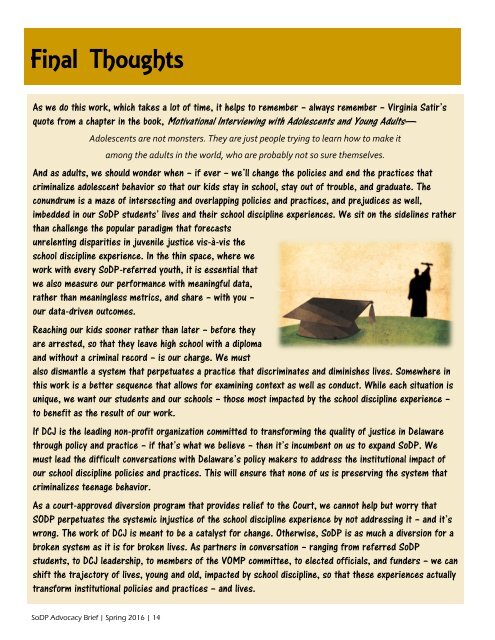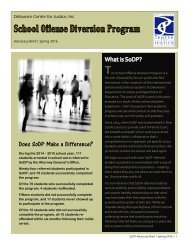SoDP Brief Final Set Up
You also want an ePaper? Increase the reach of your titles
YUMPU automatically turns print PDFs into web optimized ePapers that Google loves.
<strong>Final</strong> Thoughts<br />
As we do this work, which takes a lot of time, it helps to remember – always remember – Virginia Satir’s<br />
quote from a chapter in the book, Motivational Interviewing with Adolescents and Young Adults—<br />
Adolescents are not monsters. They are just people trying to learn how to make it<br />
among the adults in the world, who are probably not so sure themselves.<br />
And as adults, we should wonder when – if ever – we’ll change the policies and end the practices that<br />
criminalize adolescent behavior so that our kids stay in school, stay out of trouble, and graduate. The<br />
conundrum is a maze of intersecting and overlapping policies and practices, and prejudices as well,<br />
imbedded in our <strong>SoDP</strong> students’ lives and their school discipline experiences. We sit on the sidelines rather<br />
than challenge the popular paradigm that forecasts<br />
unrelenting disparities in juvenile justice vis-à-vis the<br />
school discipline experience. In the thin space, where we<br />
work with every <strong>SoDP</strong>-referred youth, it is essential that<br />
we also measure our performance with meaningful data,<br />
rather than meaningless metrics, and share – with you –<br />
our data-driven outcomes.<br />
Reaching our kids sooner rather than later – before they<br />
are arrested, so that they leave high school with a diploma<br />
and without a criminal record – is our charge. We must<br />
also dismantle a system that perpetuates a practice that discriminates and diminishes lives. Somewhere in<br />
this work is a better sequence that allows for examining context as well as conduct. While each situation is<br />
unique, we want our students and our schools – those most impacted by the school discipline experience –<br />
to benefit as the result of our work.<br />
If DCJ is the leading non-profit organization committed to transforming the quality of justice in Delaware<br />
through policy and practice – if that’s what we believe – then it’s incumbent on us to expand <strong>SoDP</strong>. We<br />
must lead the difficult conversations with Delaware’s policy makers to address the institutional impact of<br />
our school discipline policies and practices. This will ensure that none of us is preserving the system that<br />
criminalizes teenage behavior.<br />
As a court-approved diversion program that provides relief to the Court, we cannot help but worry that<br />
SODP perpetuates the systemic injustice of the school discipline experience by not addressing it – and it’s<br />
wrong. The work of DCJ is meant to be a catalyst for change. Otherwise, <strong>SoDP</strong> is as much a diversion for a<br />
broken system as it is for broken lives. As partners in conversation – ranging from referred <strong>SoDP</strong><br />
students, to DCJ leadership, to members of the VOMP committee, to elected officials, and funders – we can<br />
shift the trajectory of lives, young and old, impacted by school discipline, so that these experiences actually<br />
transform institutional policies and practices – and lives.<br />
<strong>SoDP</strong> Advocacy <strong>Brief</strong> | Spring 2016 | 14



